#instead of actually developing already existing aspects of the narrative
Explore tagged Tumblr posts
Note
I don't know if I'm alone in the opinion of most series that are long running having bad or mediocre endings.
MHA is going to join the long growing list of series that fans had hope for but were let down with.
Sucks too, because people get invested in series that they think will be worth sticking for to the very end.
Well it depends on what someone's definition of a long series is to be honest but you do have a point. A long series will have more plot points and more plots and arcs that it will need to try and neatly tie up resulting in a satisfactory ending. Also the longer the series the more time we have with characters that we get attached to and the more people are attached the higher the emotions and stakes to have a somewhat decently written ending.
I believe that MHA has branched out too far, too wide when it came to the plot but it actually never dived deeper into already existing material which is why almost everything in MHA feels underdeveloped, underwhelming and overall lacking.
Iam not saying that long series can't be good and well written it's just that it's incredibly difficult to do so when compared with shorter series or stories.

#mha#mha critical#bnha critical#bnha#bhna critical#horikoshi critical#thanks for the ask!#thanks for the ask#thank you for the ask#thanks anon!#thanks anon#i feel like hori branched out too far and wide#he never properly delved deeper into already existing plot points and characters#but i see why because hori did say that his strong auit was creating concepts and characters#instead of actually developing already existing aspects of the narrative#its a shame#this isnt the first long series that has disappointed me to be honest
22 notes
·
View notes
Text
.
#lately i've been going to twitter to get some lunter action bc most fanartists are there#and god it's just so annoying that over there they're stuck in a 5 day cycle of the same discourse over and over again#is it okay to ship this or is this a dirty nasty morally questionable proship? uwu#then the realization is 'yes lunter actually isn't a disgusting perverted proship which makes it okay to exists even if i HATE it'#and then two days later someone is like um akshually it's disgusting because incest and here we fucking go again#god. we need to extirp anyone under 16 years old from the internet. you have not developed enough brain matter to be on social media#(now if you're an adult unironically arguing in that discourse you either have a lot of free time or i just need to block you)#but man. like i wanna say to those lunter defenders..... can't you see what's wrong?#can't you see that the moment you've chosen to accept the premise of there being 'good' and 'reproachable' ships you've already lost?#that someone will always be able to pick a 'problematic' aspect in any ship ever?#that entertaining that idea from the beginning is the absolute worst thing you could do?#like i prefer when people call lunter boring. okay yeah i do Not see what you're seeing but also#thank fucking GOD we're bringing up actually relevant stuff here#like part of me is so fascinated about this. how murder seems to be the only thing that's accepted in media as a narrative tool#(and at some extent even that is too much)#but this yet again goes back to..... well what the fuck do you interact with fiction and media in the first place#when you're COMPLETELY unwilling to acknowledge any of these things as FICTION (not real) in the first place?#where your favorite character is the most morally correct and your favorite ship is the 'healthiest'?#i just wish we were able to talk about who the characters are and what their dynamic means in the show you know#instead of recycling the same reasons why it's morally 'okay' to be interested in them over and over and over and over and over and over and
4 notes
·
View notes
Text
Imagine looking at a character whose entire premise is that in every stage of his life, he's made every version of himself into someone that inspires people to such a degree that EVERY SINGLE VERSION OF HIM has people wanting to literally follow in his footsteps in some way or another.....
And coming to the conclusion that like.....the most important things about him are the sum of all his trappings. His entirely homemade developed from scratch could not exist if not for what he already was and brought with him BEFORE crafting this newest version of himself trappings, with his greatest trait throughout all of it being his adaptability; his ability and willingness to roll with the punches and not try to simply weather any opposition or changes to his life but instead reshape himself as needed to better fit INTO whatever new shape his life and the world around him takes. All while managing to carry the most innate, fundamental and necessary aspects of himself from one version to the next. Thus every single version of himself is different but simultaneously every single version of himself is also undeniably the same person.
The strength of this character, to me, will always be that he can be so many versions of himself, he can become so many things, all without ever actually losing or discarding any of the aspects of himself he considers most essential, the things he's not willing to lose or give up just to keep going. Finding that road not taken by most, usually because most never even think to look for it as an option. But one that he's always able to find because the one trick he's mastered in his tumultuous life is threading that needle of not just digging in his heels in an unproductive way but rather being selective about when and where he makes a stand and decides "this is not a thing I'm willing to compromise about" but here are places and ways I can and will change and evolve and adapt in order to make it possible for me to hold onto these parts and keep them as they are.
And that's why its always so mind-boggling to me that so many writers can't seem to think of anything else to do with Dick Grayson other than invent some new reason for him to just....not be that person, or to like just take the character whose most basic fundamental trait he's NOT about to compromise on is willingly giving up his spot in the driver's seat of his own life.....and make him just a passenger in his own life and stories.
Dick Grayson at age nine....at age nineteen...at age twenty nine....the one core thread running through all versions of him is the only way he's standing back and letting you call the shots for him or putting him on the sidelines in some way is over his dead body.
HOW he goes about that, what that looks like, who he becomes and what aspects of himself he plays up at some times and what traits he lets fall by the wayside at other times when they offer less in service to his primary goal here....that changes constantly. He changes constantly.
But those changes are almost always (or at least they used to be/should be IN MY OPINION) made with the intention of keeping certain things about him or his life as consistent as possible.
That's the duality of Dick Grayson that I'm here for. The inherent contradiction of him that COULD allow for endless conflict and breaking new narrative ground in all sorts of ways if mined properly:
His eternal willingness to compromise....but only ever in pursuit of doubling down on the ways he's not willing to compromise.
Forever walking that tightrope in ways that only a kid born and raised in a circus could ever hope to.
#see also: my grinding teeth when people disparage his circus origins#like the only thing its good for is colorful backstory and explaining his acrobatics#THERES. SO. MUCH. THERE.#theres so much EVERYWHERE in every aspect of his backstory and his preexisting comics and yet over and over we get#....what if we just ignored all that and did what the fuck ever as though this character has nothing integral to him or fundamental to say#to be fair my gripes with Taylor are not exactly interchangeable with my gripes with the previous runs#but I lump him in as an extension of them because while evocative of different SIDES of my ennui with these takes on Dick.....#the thing about Taylor's stuff to me (or the parts I read at least) is that its generic as hell while only retaining superficial elements#of Dick's character and stories in order to point to them and say see these are definitely about Dick Grayson. like....only in very surface#level ways. underneath that theyre basically generic superhero adventures that could easily be retooled to be about a pretty sizable number#of other characters. tbh with the whole alfred inheritance thing it honestly felt from the get go#that Taylor was more interested in writing a kinder gentler Batman like a Bruce from one of the animated shows like#The Brave and the Bold who gets along better with everyone else. even the way the Brave and the Bold largely exists to use Batman's#popularity as a star vehicle to platform his co-superhero for the episode lends itself to Taylor's approach in his NW run#with the central figure - only nominally DG imo - basically existing as a platform allowing for the drafting of any other character he want#to write in any given arc or story in a similar way to how Bruce is utilized in Brave and the Bold#anyway. idk idk. my issues with Taylor are not the same as the others exactly but also they are and also I just plain dont like the guy#so I complain about him at any given opportunity even when its not technically as accurate or relevant as it possibly could be#I Am Flawed. its fine though dont worry about it. its called being nuanced
184 notes
·
View notes
Text
i think Sophie's personality took a nose-dive when Shannon over 'girl-bossed' the entire narrative surrounding all the girls in the books.
does this make sense??
I loved Sophie books 1-5. She had a fierceness and heroicness and a willingness to do what she believed was right from the get-go. But then somewhere along the line her already existing personality traits were shoehorned into this cringe label and over-saturated by characters like Ro who are always like "Girl power! and glitter!"
Sophie had so many great traits from the start-- but lately, her character almost feels like a caricature of those traits.
and I am NOT saying there is anything wrong with empowering women and girls-- however, the writing comes off as weak when it's spoon-fed to you that THAT is how you're supposed to perceive the character. Sophie was cool and smart and empowered way before the narrative decided to become "aware" of it in a textual sense. She was cool as hell before the books ever went "NOW THAT'S A STRONG AND POWERFUL GIRL!!! SEE THAT STRONG AND POWERFUL GIRL??? SHE"S SUCH A STRONG AND POWERFUL GIRL" like??? mf?? I READ the books. I ALREADY KNOW.
She was a leader from the beginning. She was a leader because she cared enough to do something about something. Way before the Black Swan named her the moonlark, and the leader of Team Valiant.
And she continued to develop those leadership skills over the books, until at some point, the writing became too aware of her development and shoved it into your face, instead of it being a subtle arc that spoke for itself.
but also... the way Shannon seems to want to sell her development doesn't exactly match with what she's written. There are moments in the books where characters shower Sophie in compliments that come off as generally untrue...
One of the defining aspects of Sophie's personality is her insecurity and secrecy. Which are traits that can be annoying at times, but are realistic. Regardless of those traits though, she still had dimensions and was willing to stand up for what she believed in from the beginning. The thing is, her insecurity never quite went away. If you read any of the later books, she has crippling self-doubt and identity issues. But then you have characters like Ro coming in and saying things like "Ur so confident!" and it just comes off as a very strange cognitive dissonance in the narrative.
No, Sophie isn't confident in her ability to lead, regardless of what the books say in small tidbits, when the whole of the books show that she is quite insecure, but believes in her values enough to do something to protect them-- which automatically shoe horns her into a leadership role.
What was admirable about Sophie's character was not her confidence. And is not her confidence. She's admirable because she's deeply insecure and flawed and not an amazing leader, but that she still tries. Sophie is a leader because she tries, because she steps out and says "this isn't right!" not because she's actually good at it. She does not have a lot of the typical qualities that make good leaders. She's not very outspoken most of the time, she's insecure, she's more introverted-- she's just a character who is justice oriented, so she rises above those feelings. WHICH IS A BETTER NARRATIVE CHOICE THAN "No Foster, ur actually a perfect leader <3"
I boil this down to:
TWO CONTRADICTING TRAITS CAN EXIST AT THE SAME TIME.
Sophie is insecure, and lacks confidence. But she's also moral, and therefore does her best to be a leader.
She's brave. Not confident.
am I making any sense??? I feel like I have a point and it's getting lost a bit here. Maybe I'll come back and clarify things another time. rn I'm tired.
ALSO: I fear the same thing happened to Biana and Linh.
I deadass think the introduction of Ro is what began it all. She's a try-hard character for female empowerment, that comes off as very forced and shallow.
73 notes
·
View notes
Text
Some info about (A strong ship and a swift ship) to take me home:
What is it about?
It's an AU where I try to incorporate Nausithous and Nausinous (Odysseus' children by Calypso according to Hesiod. (No, not the Odyssey! Odysseus doesn't have any other children mentioned in the Odyssey other than Telemachus!)) into a mix of Epic and the Odyssey. It was originally (very loosely) inspired by Akaittou's fic: Hanging on in Quiet Desperation. I read the latest chapter (9, at the time) and was inspired by the threats, and wondered how horrifying it would be if it Calypso made Odysseus pregnant instead...
And my brain went: well time to write some angst and psychological/body horror! (keep in mind that the mpreg is strictly for angst purposes! There's no kink involved bc 1) I have no idea how I'd write that, and 2) it's Calypso and r4pe is not sexy. Of course, I also tried to write Calypso getting pregnant, but I found that I wanted to keep the body horror aspect instead.)
The rest of the plot (up to chapter 5 so far) follows Ody's mental state, as well as his complicated relationships with his children and captor Calypso, all while Telemachus haunts the narrative.
Now, for those of you who are familiar, how about some more specific questions/trivia?
1) The boys' names meaning:
(One of the readers actually noticed this and commented, so I'll include my response below:)
Initially, I read somewhere that Nausithous' name was translated as "swift ship", while Nausinous' was "strong ship", so I wrote the first chapters with that in mind, but after some research, I couldn't find any translation of Nausinous' name meaning "strong ship". Instead, the academic source I found translated the name (roughly) as "smart ship". It was too late for me to rewrite it into the title by then, so instead, I just included it into Nausinous' character (his amazement with wisdom, and his imagination)(see ch 4)!
Additionally, Nausithous shares a name with Nausicaa's paternal grandfather/maternal great-grandfather, a son of Poseidon. Idk if I'll do anything with that, but I think it's pretty funny that both Odysseus and Poseidon have sons that share a name.
2) Why did I choose Nausithous to be the oldest, and not Nausinous like some other fics do? And why did I choose to give them an age gap?
Hesiod's Theogony (aka the source I found of the boys' existence, since they aren't canon to the Odyssey (I cannot stress this enough! I really don't want to spread any misinformation!)) doesn't mention who's the older one, or whether there was an older one to begin with, so it's basically fair game. I interpreted Nausithous as the older one since Hesiod mentions him first. "And the bright goddess Calypso was joined to Odysseus in sweet love, and bore him Nausithous and Nausinous." (Hesiod, Theogony, 1020)
After I already wrote up half of story, I found out that it was more popular to have Nausinous be the older one/more responsible (in the case of twins) (I still don't know why? Is there another source I haven't found? Or is it just the popular headcanon? If anyone knows the reason, please tell me!) At that point I just decided to go with my own interpretation since it felt weird to just switch the boys' names after I already gave them different personalities...
Speaking of personalities... The reason the age gap between them exists because it was easier for me to give the boys distinct personalities that way. If I kept them at a similar age, they would have had very similar roles, and I would have had problems writing the story. Instead, I had Nausithous going through the more obvious struggle, while Nausinous serves as a more subtle example of what Ogygia can do, as well as being a break from the angst (to an extent, I guess.) Additionally, the pregnancies happening twice as well as the circumstances behind them, serve as development (not necessarily good) for Odysseus, and I think it wouldn't have as big as an impact if the boys were twins/one pregnancy, or if they were only a few years apart...
3) Are the boys going to leave Ogygia/will there be a happy ending?
I get this question a lot, and I'm pretty sure it's because I keep cranking up the angst for each chapter... Oops...
Well, for the sake of not torturing you all with the what-ifs: yes, there's going to be a happy ending, and those boys are definitely getting off Ogygia.
Sure, I love angst, but even I'm not that cruel!
4) Can I send headcanons/fanart/questions about your fic or the boys?
Of course you can! I'd love to hear your own characterizations of the boys, even if it has nothing to do with my fic!
(Idk if this needs to be said, but keep in mind that this is strictly a no AI space! I'd love to see your fanart, snippets, headcanons, etc, AS LONG AS it's purely your creation! I won't tolerate anything if I learn that it's made with AI!)
And if you all have questions about my characterization of the boys/other characters (or if you just wanna chat about them), feel free to send an ask!
10 notes
·
View notes
Text
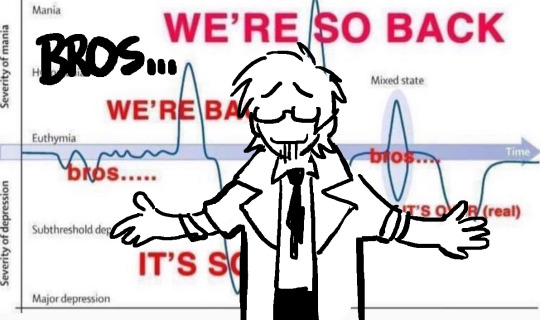
i have finished death mark 2...... thoughts.....
general thoughts is the overall story was.... BAD. LOL.
I'll start with the good. The interactions between Yashiki and alot of the returning cast i really liked, the writing especially in the first few chapters. An example being alot of Yashiki and Daimon's chatter, especially the whole weight of saving lives things that comes back at the end, alot of it was quite sweet and heartwarming similarly between him and other mark bearer characters.

^^^ BEST CG EVARRRRR....
I liked the choice of Hiroo and Mashita being the two that come in when he's at his lowest, their curtness and refusal to take his attitude was really refreshing, felt really like what he needed at the time lol. In that same vein i enjoyed his characterization alot in the early-mid game, and how it develops. He's such a sensitive guy lollll and it comes through well with how much he cares but near the latter chapters it kind of.... sours.
Though there were a few new characters i liked his interactions with, Abe and Maruhashi specifically i found endearing of the new cast, Alot of them just Die. Or theyre Hime and Michiho AKA the bane of my fucking existence with this game.
They are the two pushed front and center and it is truly its worst aspect, as characters they're shallow personality wise and though you could say that about others in the cast, them being in love with Yashiki on top of it makes it so much worse.
They barely have any scenes where they actually properly interact and feel like they bond at all but for some reason im expected to believe they're suddenly in love with him?? -and in the end they were also dead the whole time, and not even themselves. So it wasn't even real, and somehow any of this is meant to hold any weight to the audience...?? explaining it as the ghosts being desperate for him instead doesnt really make it.. any more compelling (lol the scene at the end where hes like maybe they just wanted those beautiful normal school days they spent by me.... when did that happen yashiki)
I understand Yashiki is probably saddened by the deaths of two young girls but they're treated with so much more weight and gravitas than anyone else in the cast and its so unearned, especially when alot of the other ghosts are somehow way more compelling in that aspect.
He also becomes borderline ooc around them like in what world am i expected to believe he emotionally dumps his burdens on the two highschool girls he barely knows because of how sad he is when hes got like how many other people he knows FROM THE OTHER GAMES he could do that with...????? (AND BASICALLY DOES... ALREADY...?) and it lifts his heart like truly wtf was i reading. HE WOULD NOT FUCKING SAY THAT.JPG
Chapter six is really where it falls off the cliff with this, after hanging out with Hiroo, Mashita and Yasuoka and solving that case they just dissapear from the narrative for a day so he can......... hang out with michiho...?? i couldn't even enjoy murder yashiki in this game because of how ludicrous it felt that the rest of yashiki's companions just dissapeared to make it happen, and no one calls or anything lmfao. I cant imagine how much more compelled i would have felt if he was dealing with that situation with any of the other three around instead of HIME. LIKE I AM ACTUALLY SO INCENSED ABOUT THIS SCENARIO BEING RUINED SO HARD WHEN IT COULD BE SO GOOD BUT I DIGRESS (RIPPING MY HAIR OUT) (CRYING BC I LOVE BLOOD AND HORROR)
Even the first two games weren't as bad as writing women as this!? EVEN IF I HAD TO SEE MASSIVE TITS ON SCREEN THEY WEREN'T TRYING TO JUMP ON YASHIKI AS WELL AS A CENTRAL PLOT POINT (lol kakuya) congrats exp you have outdone yourself with the misogyny.
To continue on the topic of new characters, it feels like so many of them were given so little screen time to make you actually care about them. For how prominent Abe is he barely actually does anything, and Maruhashi instantly dissapears when shes no longer a red herring. On top of this game basically killing off any other character that appears, its hard to get invested in them as characters at all.
You have no opportunities to actually effect their fate as you do in the other two games, so there's even less attempt to immerse you there. Horikoshi comes the closest behind the other two but its because her case with Hanako was easily the strongest and most resonant of the game (lgbt win). Its not even like this is the first time Yashiki saves the lives of kids and bonds with them after, especially with the caveat of being a teacher, like how did you fuck this premise up so bad.
They either needed to commit to more scenes and writing in general to attach you to the new characters or just not have any returning ones show up so prominently if they're not also going to further interact with them.
The overall mystery suffers for it, and while i like the twist of the doll being helpful in this game actually, it is so easy to guess michiho and hime are the departed, and i already didn't even like them so it doesn't hit at all emotionally. Like, i was not feeling very betrayed or anything lol.
Further critiques -> though running around is very fun, the horror in this game really didn't at all compare to the others with the loss of that first person perspective for alot of the exploration, sad.
I also feel like we got more horny shit than we did in NG which is also like lol one step forwards two steps back. Even the gore wasn't as good............... kind of mid in every regard there. I did like the mushroom and scissor stuff, but the bugs and mold ended up just kind of ..... eh...
Mary continues to be the best antag in these games, she slayed and she continues to keep slaying. The sisters were really kind of a letdown in the end, especially since i think i could have enjoyed it if they pulled them off better.
As for my yaoi cocaine score though thats a 10/10 they made yashiki and mashita meow and hiss like cats in this game for some reason, i genuinely think that shattered my mind a little.
I also can't believe they gave us these two panting in unison asmr as well so you could make your own [REDACTED] if you wanted. The departed getting jealous mashita was standing next to him in that one confrontation too like she's calling him a homewrecker..... lol...... also the part where mashita jokes abt him keeping the gun and if you make yashiki go 'then i will 😇' and him immediately backpedaling like okay i was kidding. give it back. very moe very powerful.
I feel like the entire time mashita was on screen he was basically acting as yashiki's brain to keep him from getting too lost in his emotional attachments, truly everyone needs a bitch wife to keep them sane.
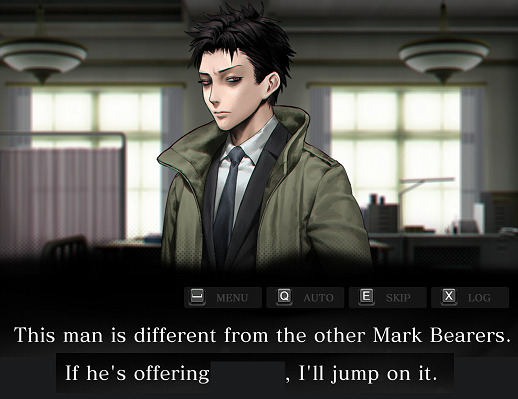
TL:DR this game could be so good (average) if it wasn't so fucking badDDDDDDDDDDDD easily the worst entry in this series...... dont buy it unless its on sale for 4 bucks (this applies to every game) or just watch in on youtube lol.
anyway. beautiful yashiki collection. I CANT BELIEVE MASHITA DIDNT GET A BAD END CG ACTUALLY < / 3 BUT YASHIKI'S IS REALLY GOOD < / 3 SMALL WINS < / 3

#chitter chatter#gore warning for cgs and also spoilers for the whole game#i made this post instead of a 3489034890 long thread on my priv twit rejoice#im going to draw yashiki like next week regardless of my shit talking bc hes my oc now
74 notes
·
View notes
Note
Hi! I love your art style it's like. Breathtaking. And your hcs on barry are some of my favourites of all time?
What do you think of "The Ballad of Barry Allen by Jim's Big Ego as an analysis of Barry's character?
are you asking or are you telling me 🤨 lol THANK YOU i put all my headcanon power into him <3
for the ballad, i love their song stress, and this isn’t bad at all as far as fansongs go. but there’s a reason i don’t include it in my barry playlist, and it’s ultimately bc it doesn’t fit my narrative haha
the song was made in 2003 and i haven’t read many comics before then, so idk how well it aligns w barry’s characterization prior to flashpoint, but i’m basing my playlist off post-flashpoint, so that’s where a lot of the differences will lie
for starters, the song only includes one half of barry’s relationship to his superspeed, and it’s important to me that a barry interpretation includes both sides of that coin. instead, it’s playing on the idea of the dark side of the hero fantasy, an inherently optimistic genre. which, fair, being a superhero sounds like a nightmare, but that angle is less novel to me when that’s the extent of the analysis (and i’m a little over the whole “i hate being a superhero” storyline in general, personally). the song is basically abt how much it would suck to have superspeed bc the world slows to a crawl and you’re left behind bc no one else can keep up w you. and it’s true, that is a very real setback! especially for someone like barry who’s already prone to self-isolation and time management issues! but what does the song actually have to say abt him as a character?
the thing is, barry isn’t a “i wish i wasn’t a hero” kind of guy. he’s a “could i be so strong [to give up the flash]? or do i love the thrill of these powers too much?” kind of guy. he’s a “knowing what i know now… if i could go back in time… maybe i would’ve been somewhere else the day lightning struck my lab and electrified those chemicals, ready and willing to forfeit a life of dodging deathtraps and battling villains… who am i kidding? there’s no going back. no do-overs. like everyone else, superheroes can only follow the path destiny has laid out for them, whatever lies ahead.” kind of guy. yes, barry is caged by his superspeed, but it would be misleading to not present it first and foremost as the very thing that frees him. it’s a double-edged sword that gives him purpose, and that freedom in obligation is what motivates him to keep going. as a wise man once said, “all you can do is go forward.” (“thanks.” “superman is pretty smart isn’t he.” “hm.”)
i think the real kicker for me was this lyric: “i’ve got time to think about the past… how my life was so exciting before i got this way.” my sincerest apologies to mr. allen, but he does not feel complete to me without his mother’s death or his father’s false imprisonment. this backstory contextualizes everything for me. his life was NOT exciting before his superspeed, it was lonely and full of escapism, either in his sci-fi/comics or his dedication to finding justice. i am of the belief that barry didn’t truly start living until he got his superspeed, over 2 decades of waiting around before he rly understood freedom and what it meant to live for himself. i get what they’re trying to do here, but this is what i mean when i say it feels like the song characterizes barry around the concept of his speed rather than how barry’s speed defines him as a person
ik i can’t expect a 4min song to include every aspect of a character’s timeline/development/nuance (esp before some of that even existed lol), but my issue isn’t that it doesn’t cover enough ground—it’s not bad that they had a theme and stuck by it, i actually love the lyrics from a speedster perspective. my issue is that i don’t think this is a good framing for barry’s character as a whole. for all his regrets and suffering, barry is optimistic to the point of denial. choosing this to be The theme to represent barry just. doesn’t feel like barry to me. it’s more like barry is the placeholder subject as an excuse to sing abt superspeed
if this was somehow less overtly a “BARRY ALLEN FANSONG” and maybe more metaphorical or even non-fandom, then it would be a dif situation and i might have dif opinions. at the end of the day, this has more to do w my pickiness than the quality of the song, and the fact that it even exists is so exciting for me as a barry allen enjoyer first, human second. but if you’re going to call smth a character study, i Will be getting my hopes up
#barry allen#the flash#dc#danswers#danbles#i’ve never had to put this into coherent thought before usually i’m just being a hater unprompted in my friends’ dms LOL#which i think should emphasize that my opinions say more abt me than this song or even barry#but ty for the kind words + ask! this was rly fun to rattle around in my brain#i love having strong opinions abt things that don’t matter 😋
23 notes
·
View notes
Note
I remember people said the scene in Transmission, where Ladynoir renounce their Miraculous and "seemingly" not thinking about each other are mean to be a plot hole, not character inconsistency.
Bt for me, if the character NOT even make a slight uncomfort gesture/expression when they see Scarabella and Black Minette out there instead of their team mate, then it's not a plot hole, it's character inconsistency.
"Plot hole" excuse only work if Adrinette make any comment/looks surprised/make any reaction upon seeing the new duo but the aired time won't let the show do more than that. But the show doesn't let them react negatively which resulting people interpret it as "Yeah I don't care about my team mate, I already got my gf/bf anyway" which is not plot hole at all.
It's 100% character inconsistency. Plot holes are when the plot is wonky, and some logic doesn't logic. When a character acts OOC, it is character inconsistency. Adrien and Marinette have both become wildly OOC since the second Adrienette became canon on this show. They don't care about superheroing anymore, they don't care about each other as Ladybug and Chat Noir anymore. Outside of like, one line about "I hope Ladybug/Chat Noir are okay" (which is quickly overshadowed by some Adrienette, cause we sure do need more of that when we're talking about the late Ladynoir), they just don't give a fuck.
Actually, this isn't even character inconsistency anymore, this is a whole character overhaul a la whatever happened to Felix Fathom. Cause Adrienette only works if you change significant aspects of their characters. What about Chat Noir meaning freedom and a means of escape for Adrien, what about Ladybug being the narrative opposite of his abusive father who gives him unconditional love and acceptance? Fuck that, what he really needs is to start centering his identity around his classmate (with whom he isn't even that close because she thinks he's perfect) and defining himself based on her needs. And what of Chat Noir being the only one who can understand Marinette's struggles? Chat Noir being her special partner whom she can always lean on? Nah, fuck that shit lmao, here's Marinette trying to tell Adrien something he already knows and Marinette trying to hold Adrien's hand even though she's done that before without a problem!
Anyway, like I was saying, they had to change their characters up so that Adrienette could make sense, because it sure wouldn't make sense if it became canon in the show that devoted the bulk of its development to Ladynoir, now would it? So that's why we get episodes like Determination, where Adrien is suddenly head over heels for Marinette out of fucking nowhere, right after the Jubilation dream sequence where they had those cabbage patch kids, and Ladybug initiated a kiss even though they realized this was a dream, and they were clearly having some complicated feelings about the whole thing at the end of the episode. Cause fuck Ladynoir, amirite? Like, why would we waste time on the relationship we spent 5 seasons developing when we could focus on some cookie cutter high school romance with retcons galore and multiple, I tell you, multiple scenes featuring Marinette suddenly having the inability to do things she's done before with no problem, and apparently, it's all Chloe's fault, like what a fucking shocker, who could have seen that coming.
And lets not get into the actual plot holes in Transmission too, cause those also exist? How does Adrien Agreste know and proudly state Scarabella's name when no civilian knows she exists? How does this not make Marinette question why he knows? Why does Marinette expect that someone else becoming Ladybug means she's free when she's still the Guardian? Make it make sense, please.
Anyway, that's all I got. I'm sorry for using your ask as a venting post, anon. I just rewatched Gamer today, and god, Adrienette are so cute and adorable in Season 1. Like, they actually have chemistry and fun interactions and it's the lucky charm debut episode! I will never forgive this show for taking that Adrienette away from me and replacing it with... whatever Season 5 coughed up.
Thank you for your ask!
#ML Salt#ML Writing Salt#ML Writers Salt#Marinette Salt#Ladybug Salt#Not really but tagging to be safe#Adrienette salt#Asks#Meta#My meta
41 notes
·
View notes
Text
The Brief: What I'm keeping and what I'm not
Tether Concept and Constellations
At this stage of the project, I’ve done a significant amount of research, to the point where it’s becoming difficult to distinguish what I’m keeping from what I’m actually going to use. Instead of listing everything I’m including, it’s easier to highlight what I won’t be using.
One aspect I’ve decided to leave out is my research into constellations. While mythology and academic research are valuable, oversaturating the narrative with too many symbolic layers would be unnecessary. Constellations have a mix of historical accuracy and fables, and while I initially explored a connection between them and the judges or sins, I’ve decided against it.
The judges and sins function as separate entities—the judges enforce judgment, while the sins represent condemnation. Neither is above or below the other; they both serve distinct yet equally important roles in the process of sentencing souls. Because of this, there’s no need for a tether between them or constellations marking their relationship. I already have symbolism embedded in the design of the characters and environment, so adding another layer through constellations would be unnecessary.
Aspects of Buddhism
When designing the morality of my world, I explored several aspects of Buddhism, incorporating some ideas while ensuring the story doesn’t revolve solely around religion. The focus is on the morality of the world and how preconceived notions of sin define what makes someone "bad."
The seven deadly sins aren’t explicitly mentioned in the Bible but are instead a culmination of various biblical verses that highlight sinful acts. Since they are associated with biblical teachings rather than directly stated, I’ve taken a similar approach with Buddhist concepts—I don’t want to directly integrate specific teachings but instead allow them to serve as a framework through which people can interpret the story from their own worldview.
The cyclical nature of the story—floating upward into the void, facing judgment, and then descending back—can be interpreted in many ways. For Buddhists, it may resemble samsara, but the story isn’t meant to perfectly align with that concept. Instead, the repetition could symbolize reincarnation, a near-death experience, or simply the idea that the character is neither judged nor accepted, causing him to be sent back to where he came from. Rather than a perfect cycle, it’s more of a bouncing back on a linear path, emphasizing his lack of belonging rather than a predetermined fate.
Judgment & Fate in Asian Cultures
My research into judgment and fate in Asian cultures wasn’t meant to directly incorporate these ideas into my project but rather to understand existing perspectives and refine my own story. I wanted to ensure that my narrative was on the right path and that my approach to these themes was well-informed.
The foundation of my story stems from personal experiences and the views I’ve developed because of them—particularly my belief that disloyalty is one of the gravest offenses. This wasn’t a concept I added on a whim; it was a core idea before I even discovered that Dante had a similar viewpoint, placing treachery in the ninth circle of hell as the worst of all sins. Dante used historical and theological figures to build his depiction of treachery, and while some might argue that my approach isn’t original because of this, I see it differently. Instead of feeling like I’ve copied an existing idea, I view it as a lighthouse guiding my project’s narrative—proof that others have explored this road before and that my ideas aren’t unfounded.
In many ways, learning that Dante shared similar views was comforting. It reassured me that my perspective on betrayal as the ultimate sin wasn’t misplaced. That said, my research into various cultures’ perspectives on judgment and fate isn’t about directly incorporating them into my story. Rather, it’s about expanding my understanding of how different societies interpret these themes. This knowledge helps me write a more compelling and refined version of my own ideas, ultimately allowing me to be a better artist and storyteller.
0 notes
Text
Also, I’m much more on the manga/brotherhood side of the fandom, but decided to share a couple of things I feel the strongest about with 03:
-The episode with Barry the chopper tends to get a lot of praise, even from people who prefer Brotherhood/Manga, but one aspect about it rubs me the wrong way, to the point that it kinda ruins the whole thing for me, even when the rest of it is solid. That aspect is that I don’t like how Winry is used in it. Seeing a character like that literally bound and gagged feels wrong, but I don’t think I can criticize this aspect too much, she is still a child, and her naivity was an aspect even in botherhood/manga, so even if I don’t like seeing it, I can accept her getting kidnapped, especially as even Ed does as well. What really bothers me is that she gets treated less like a character and more like a tool for Ed’s angst. The point of the episode, to put it briefly, is to traumatize Ed, so Winry getting kidnapped is not about her, it’s about Ed feeling bad that he let something bad happen to someone close to him. After the ordeal is done, how she feels is not important, only Ed. The episode has a major impact on Ed’s character, While how it affected Winry isn’t shown (it seemingly didn’t) because it was never important – she wasn’t an important character and her own person who went through that experience, she was a damsel who existed to make Ed feel worse, and that bothers me.
-The Rockbell killings were done infinitely worse. I think people generally prefer Manga/Brotherhood here, but most are probably more charitable towards 03 than me, and do see people saying that one is better occasionally. The Manga/Brotherhood version used it really effectively to give both Winry and Scar a major character arc, and made for very effective emotional moments (their first confrontation is my all-time favorite scene, especially in Brotherhood with the ED fade-in). In 03, while the idea of Roy doing it over Scar is interesting on paper (not necessarily better, and even then the more I think about it the less “interesting” it is – mostly because the Winry-Roy relationship is unimportant to non-existent in either canon), in practice Winry’s feelings are, again, largely disregarded and not important, and it serves mostly to give Roy something to angst about (when he already has plenty, you could easily just cut the Rockbell killings and have him angst about everything else in Ishval and nothing would change). In fact Winry is so unimportant to the arc that Roy seems more concerned about explaining himself to Ed instead of the actual person he hurt. Also, genuinely don’t remember too well, but did Ed even care? In the manga/brotherhood Ed was clearly furious at Scar for it, which showed just how much he cares about the people close to him, but did 03 Ed even care?
-Realized that both my points were fairly Winry-centric, so I guess I’ll finish by adding that 03 in general did her dirty. I don’t mean the sadder ending, I mean the narrative in general seemed to consider her less important, gave less development, and overall seemed to treat her with less respect. Riza was a much lesser character too, while I’m at it. They are some of my favorites in manga/brotherhood, so while I recognize 03’s strengths and can see why some absolutely love it, it’s one of the many reasons manga/brotherhood appeals to me a lot more.
give me your hottest FMA takes (hottest fma fandom takes also accepted)
let’s not start fights but I’m bored and curious :)
187 notes
·
View notes
Note
Can I just say how freaking Satisfying it was to read the part in giving sanctuary where dream realizes that of course, to a man who grew up surrounded by the goddamn plague, a table loaded with food would be his idea of heaven? Because god, that was satisfying. (Dream, I adore you, but sometimes I want to hit you with a pool noodle.)
I find the contrast between Dream knowing things & understanding them absolutely fascinating in ur fics. For example, in come live with me, how dream starts to realize there are lots of parts of hobs life he leaves out because he thinks they are too sad, shameful, or boring for Dream. It makes his character development *chefs kiss*, and the steps he takes towards trying to understand people all the more meaningful. Because what is loving someone if not trying to know them, despite already knowing their life story? :)
;____; Thank you so much!
(I promise, CLWM will update soon, I'm just an idiot who had the next scene be a really steamy sex scene there and writing the Naxos arc of Giving Sanctuary at the same time is NOT conducive to jumping between the fics, arrrrgghhhg)
But in all seriousness, I'm having one of those "I know I was doing that because to me, there's a natural divide between "knowing" something and "understanding" something, but I had no idea I was doing it that strongly in the fic" and I feel really seen in a good way that you spotted that and you explaining it back is really making me think now and self examine and get very excited about what your observation says about the story that was both intentional but also a bit subconscious!
(Cut for CLWM and Giving Sanctuary behind the scenes rambling)
Because I believe Dream absolutely "Knows" that humans face privation but does he, a being who does not need to eat, sleep, or even breathe truly Understand what it would be like to experience that? Does he understand it enough to understand the contrast between having nothing and having excess, or does he only see the boorishness of the largess?" Dream has understanding but he lacks empathy. And worse, he often doesn't even try to have it.
There's a line in Brief Lives (which I was recently re-reading for GS) where Destruction says that in the past, Dream just saw other living beings especially humans as (paraphrased) "things that dream" - things that serve Dream's function. Almost like they're crops that need tending rather than individuals with inner lives. Which is actually a terrifying thing to learn about the creature that tends the dreams of humanity because of its potential for sheer monstrousness, of seeing those in his care as literal livestock. But I believe Dream can overcome this, he's not inherently a monster, but to paraphrase Pratchett, the root of all evil is seeing people as things, and I think from that perspective, Dream had immense potential to become a monster, for the Nada situation to be the norm not an exception and that he could have become worse if something didn't derail his trajectory. The fishbowl might have been excessively cruel but something was needed to force Dream to look in a mirror and have a serious examination of whether he liked what he saw!
And I love Hob being a source of reversal on this aspect of Dream as opposed to the cruelty of the fishbowl! Like, obviously, because I ship them and I'm writing romance instead of long form comic books, my take on how Dream could be set on the path to emotional redemption is via falling in love with another person. And I think there's canonical evidence to back that up. Heck, I think there's canonical comic evidence that the reason Hob and Dream don't have more scenes together in the comic is because you can feel Dream's self destructive narrative flexing, crumbling, breaking when he's around Hob.
Having one friend (regardless of romance but I think romance helps supercharge this) who truly only knows and likes Dream for who he is really puts lie to Dream's entire schtick about only existing as a story and not being able to change. It's hard to maintain those ideas if someone like Hob is in your life. Hob, who is the anti-story in a way, who just continues to live because being a person and being alive is the ultimate experience, it doesn't require a character arc, it doesn't require an ending to be satisfying to him!
Hob's not going to end his own life for love like someone would in a story, not even for his own child, not even for Dream, his only constant. But he will be there to share life with Dream or with anyone who partakes (I've realized while reading Brief Lives that the way I write Hob at least is basically Destruction if he wasn't Endless or Dream's brother lol and I've been noodling on that a bit). I think given Dream's melodrama, that's a very radical point of view to have in his life, and if the narrative allowed Hob and him in a room together more well... heck, even in the comic, they have a ton of bizarrely romantic interactions, like you can feel that relationship poking at the borders of the story until it's wrenched away.
Anyway! Pardon my ramblings, the ADHD meds are kicking in and I love warming up my brain and fingers for the day with a rambling meta piece XD
61 notes
·
View notes
Note
re ur last post: i was so hyped for tw movie initially. i was firmly in the why r ppl hating camp n then all this info abt production decisions (e.g. arden) n the worst marketing ever came abt n i saw how this has just ruined whatever legacy tw had left. wish they had just let it be instead of using it as an obvious cash grab to promote jeff davis' other paramount+ shit. idk how it got approved without a cast or script - their awareness of what can actually sell is so minimal its insane. rip tw
EXACTLY EXACTLY
I'm gonna use this as a place to rant okay here we go
The whole arden thing has put a bad taste in my mouth about the movie, but i was still sort of rooting for it simply for the sake of my favs and not wanting them to get their canon absolute shit all over, but it seems like that's inevitable because I have no faith in Jeff. Literally last week he posted that he's still writing the damn movie and they're weeks into filming so that says a lot about the quality we're gonna get.
specifically what I'm skeptical about:
allison - how are they gonna spin her being back? like my feelings aside because I love her but, if they try to make it seem like she faked her death and has just been hiding away this whole time, that really diminishes her character's arc. They did this really beautiful heartbreaking thing of her dying to save her friends and her sacrifice changed the tone of the show, and we've all mourned her, so pulling some kinda resurrection card really cheapens it all. Plus, it goes against her character that she would’ve left/let her friends believe she’s dead.
eli - skeptical about what they're gonna do with this hidden young werewolf child of derek's, because I swear we're gonna have to pry the trope of "young werewolf's inner conflict journey to accepting himself and using his power for good" out of Jeff Davis' cold dead hands. Like I get it, it's cute, but they did it with Scott in the earlier seasons, they did it with Liam, they tried to set it up with Alec, they even gave us flashbacks of it with young Derek, like WE GET IT okay. I hope they do something different with Eli but it's Jeff and he's literally scribbling out the script with chewed up crayons right now so my expectations are actually in hell
the characters they brought back - Jackson and Parrish, literally who asked, but whatever that's just me. Point is, there were some characters left out that actually could've had interesting narrative arcs given how open ended theirs was (i'm not even gonna get into who because yall already KNOW). This movie could have been something that played well with a mix between nostalgia of the og series and also doing something new and different with the characters that actually furthers their development. Now I fear it’s all gonna get lost in Jeff trying to appeal to a newer younger audience. And yes I know it’s Teen wolf but the marketing is literally just to the existing teen wolf audience which they know we’ve all grown up, so we’re just being used to boost whatever they wanna slap the Teen Wolf logo onto.
ruining teen wolf's legacy/did we even need this story - Teen wolf movie, also literally who asked. Dylan was right not to be apart of it, his character left off in a good place, and the show left off in a good place for what it was. It was Teen Wolf, centered around how they all struggled to protect everyone from supernatural threats as young people dealing with school and other teenage angst. Did we really need to know what they're doing 8 years from now? There was open endedness for some characters and for the plot because it's just, teens go on to live the rest of their lives and we didn't need exact answers from there. Maybe if they took a different tone with the movie and completely went away with the whole teen aspect of it and went into something more gritty and angsty and played into the adults they are now, THAT would be something I wanted to see because it would be DIFFERENT and INTERESTING that ADDS to the story and the characters already there that we know and love. Instead we're probs gonna get the young werewolf angst again with the addition of some of our favs probably dying for something stupid and having their development reduced/backtracked. Sigh.
money grab - the way they're force feeding us Eli on the teen wolf insta feels very much like they're trying to rebrand with his face and it really just pushes this feeling of Jeff using the original fan's nostalgia of the show to boost him to getting more movies with Eli at the center (yes they're all pushing 40 but look look look we're still TEEN Wolf) and launch his new Paramount werewolf show, so yeah a big cheap clout grab money grab. It's sad because there could really be something there if he went with a more adult tone, but no we're gonna get the same played out narrative we've gotten ten times over.
All that being said, we don't know much and a lot of what I'm saying is just speculating based on the info we do know and how Jeff typically operates so no one come for me, and I AM still hoping it's not a complete shit show. Not bashing any of the cast who decided to come back, I just think personally with how it's looking so far from a creative standpoint, that we didn't need this movie.
#i don't even wanna tag the movie bc i'm not trying to get curb stomped today these are just my opinions#my neurotic 3am rambling opinions and skepticism mostly#but I HOPE THAT I'M WRONG and I hope by some miracle that it doesn't ruin tw's legacy#also we need to protect liam bc if jeff does a new brotherly narrative between scott and eli then liam's in the direct line of fire hhhhhh#dylan s get your ass to atlanta i'm nervous for liam (:#ugh i just#i don't want it#rant over
32 notes
·
View notes
Text
sorry for the random reblog! but i happened to see this post, and as an artist who uses AI image generation tools, it struck me as really unlikely that artists were not involved in the creation of this sequence, whether that be storyboarding, creating training data, crafting prompts, editing the generated images/animation after the fact, etc., and after a little googling i figured i'd add more context to this post based on what i found.
not defending disney bc disney sucks and treats artists like garbage, but i think getting this info through twitter screenshots of people only saying 'AI was used' doesn't give anyone complete picture of what that actually means or what would go into that. here's some quotes from a hollywood reporter article:
Now Method Studios [Method Studios is a visual effects company launched in 1999 in Los Angeles, California], which is behind the opening, wants to clarify those reports surrounding how AI was used in the animated open made by its design division: “AI is just one tool among the array of tool sets our artists used. No artists’ jobs were replaced by incorporating these new tools; instead, they complemented and assisted our creative teams,” reads a statement from Method to The Hollywood Reporter. Method explains to THR that it used existing and custom AI tools in creating the characters’ attributes and movements in the opening, but the entire production of the opening involved traditional work of the art department, animators, compositors and other artists. Here’s the complete statement from Method, whose recent work on Top Gun: Maverick‘s visual effects earned an Oscar nomination in January. The production process was highly collaborative and iterative, with a dedicated focus on this specific application of an AI toolset. It involved a tremendous effort by talented art directors, animators (proficient in both 2D and 3D), artists, and developers, who employed conventional techniques to craft all the other aspects of the project. However, it is crucial to emphasize that while the AI component provided optimal results, AI is just one tool among the array of toolsets our artists used. No artists’ jobs were replaced by incorporating these new tools; instead, they complemented and assisted our creative teams. Method Studios’ team of designers skillfully leveraged the power of both existing and custom AI technologies to apply the otherworldly and alien look. The entire process, guided by expert art direction, encompassed the initial storyboard phase, illustration, AI generation, 2D/3D animation and culminated in the final compositing stage.
obviously we can be skeptical of how accurate these claims are, but if anyone is picturing some "non-artist" just typing a few words into a text input, generating the entire finished intro, and then shipping it as-is, i think there's a big misunderstanding there as to how artists use AI, and a big underestimation of how much artistry can be involved in creating something using AI as a tool/medium.
regardless tho, the main point i'm trying to make is that these screenshots don't provide actual information, they just tell us "AI was used" and let our brains fill in the blanks with whatever narrative we were already predisposed to believe. it's not to say that the situation can't be critiqued, or that concerns about AI are unfounded, but it is to say that twitter is designed in a way that literally encourages outrage and discourages nuanced discussion through char limits/algorithm etc., which makes pretty much any info we get from there extremely unreliable imo, and in this case it was (unsurprisingly) not especially helpful in getting a complete picture of the situation.


there’s probably posts on here and twitter that can describe this better but corporations doing shit like this because they rather not give better pay, and terms and conditions to their artists, animators, writers, and crew overall is frankly embarrassing and disgusting

#hopefully this isn't too aggressive aghksldfj i just don't like twitter#that place poisons your brain forreal#obvs nobody has to feel a certain way about this but we should have a minimum of context before forming our opinions about#what something means and what could be happening behind the scenes#my frustration is directed at the people in the screenshots to be clear lol#also if i've missed anything pls let me know
171 notes
·
View notes
Text
The significance of Aang’s age, the reason why it’s explicitly stated as being 12 (going on 13, give or take 100 years), is because this is a coming-of-age show that’s actually about truly coming-of-age as it was originally conceptualized. That is, coming-of-age as religious ritual. There’s probably one modern coming-of-age ceremony in this tradition that’s immediately and broadly recognizable (in name if nothing else) to most of the American audience atla was originally marketed toward: Bar Mitzvah (Bat Mitzvah for women).
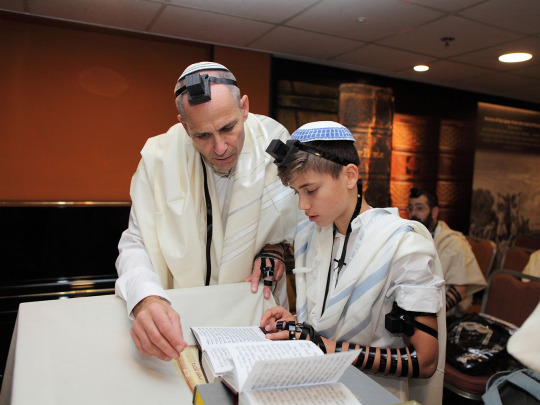
And, at what age does this ceremony take place? For boys, it’s 13 (12 for girls). This real world connection becomes more compelling when we remember that the voice actor for Aang, Zachary Tyler Eisen, is Jewish, and when we note the references to famous anti-Nazi films in a show about resisting ethnic cleansing. (”Bato and the Water Tribe” connects to The Sound of Music while “The Firebending Masters” alludes to Indiana Jones and the Raiders of the Lost Ark.)
Of course, Judaism isn’t the only religion that maintains coming-of-age ceremonies. Many faiths distinguish the pubescent age with ceremony and a shift of spiritual study and clerical responsibilities within the community of worship. I especially love this short series on a Buddhist coming-of-age initiation ceremony for boys among the Shan in Thailand for the way it displaces Western ideas of manhood.
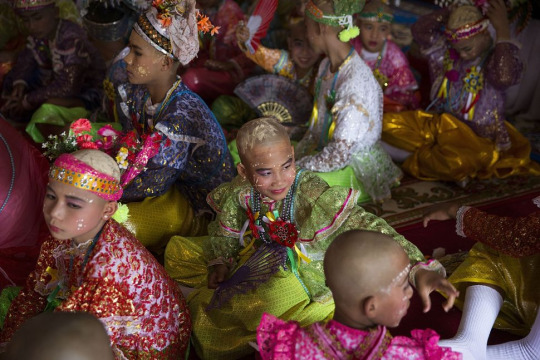
I think we often see, especially in fandom and/or purity culture, a protective zeal to singularly and strictly distinguish adulthood and childhood, and those definitions revolves around sex and sexual maturation. That is often what the coming-of-age narrative in fiction has pervasively devolved into. In fact, a religious coming-of-age ceremony was just as often as not distinct from a culture’s marrying age (which we can infer would be the age sexual relationships were considered expected and acceptable).
The coming-of-age, the transition between childhood and adulthood, instead, was focused on moral and spiritual development. The explanation of wikipedia is concise: “ Before the child reaches bar mitzvah age, parents hold the responsibility for their child's actions. After this age, the boys and girls bear their own responsibility for Jewish ritual law, tradition, and ethics, and are able to participate in all areas of Jewish community life.” We think of Aang, bereft of his mentors guidance trying to do righteously in the world, having now received the marks and celebrations indicating maturity amongst the monks.
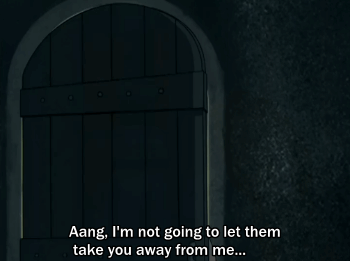
Despite that sense of increased independence, I especially want to point out the aspect of ceremony to invite a child now as a respected peer into a religious community. While the rite may extinguish the nature of a child-parent relationship, it welcomes the young person into a broader network. An excerpt from Britannica’s section on diverse Native American coming-of-age ceremonies explains, “These ceremonies provide structures for instruction in traditional knowledge...They reintegrate an individual into kin, community, and cosmos when new status is attained.” These communal processes shepherd members of a group through difficult changes and do their best to help them arrive on the other side with a clear sense of identity, belonging, and purpose. (Interestingly, this is also the ceremony at which language for new adult names and genders can be given and spread).
In terms of ethnic cleansing, wiping out the coming-of-age rite and its subsequent instruction is instrumental in destroying a people. Even if it doesn’t kill the individuals, it disrupts the network of support and tradition, which dissolves the culture. It’s one reason we witness again and again Fire Nation imperials calling Aang a child. The tattoos mark him as a versed adult among the nomads, but by ignoring Aang’s initiation, the Fire Nation can maintain it’s prideful insistence of total annihilation against its enemy. If Aang is just a kid, he is not a carrier of the monks’ ways.
But as we repeatedly witness throughout the show, Aang has a profound connection to his culture, its traditions, laws, and beliefs, and holds himself responsible for maintaining it, because he did come-of-age among his people. And, the finale is a reaffirmation of this spiritual maturity in the eyes of his community as it exists across time immemorial. ATLA reasserts the importance of ritual and spirituality in the coming-of-age narrative. It’s not about one person becoming mature. It’s about one person maturing to serve the sense of belonging their people in faith have already granted to them.
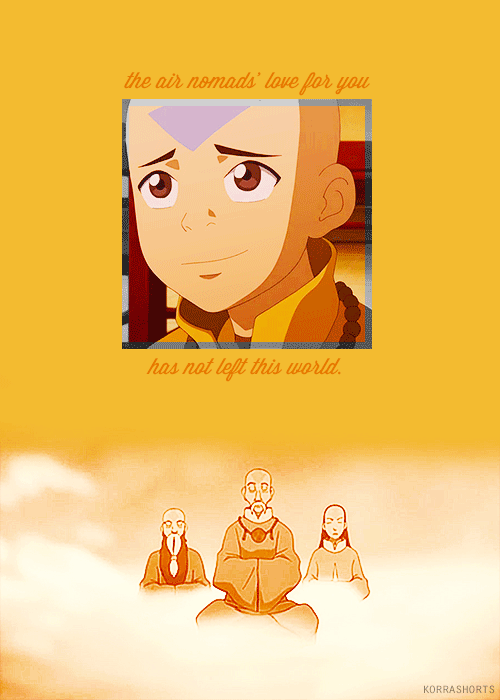
386 notes
·
View notes
Note
ppl love to forget that katara: 1. has her own taste, 2. developed around aang, he needed her for his development and vice versa, 3. ZUTARA IS SHIP BETWEEN AN OPPRESOR X OPPRESSED!!! Ignoring all of the development they had with their respective partners and the trauma Zuko caused Katara!!
In the infamous words of one Luke Skywalker: amazing. every word of what you just said was wrong.
It’s actually kind of ironic that you bring up Katara’s taste, since, throughout the show, we have examples of the guys she likes, to greater or lesser extents in canon--Jet (explicit romantic feelings on her part, word of god that jet was her first kiss--a kiss that would have been consensual, incidentally, something you should keep in mind for later) and Haru (she denies the crush, but that could just as easily have been because of the abomination he’d been growing on his lip rather than denying those feelings ever existed), both of whom have much more in common (in terms of both emotional and physical maturity, and physical appearance) with Zuko than either of them has with Aang.
Zuko’s book 3 hairstyle is almost exactly reminiscent of Jet’s, even, if not quite as floofy.
(This is probably in part because of Jet’s function as a foil of Zuko within the narrative, particularly given their book 2 encounters, which I think just further solidifies my point that, were it not for extenuating circumstances [like the fact that Zuko was introduced as an enemy and they had significant obstacles to hurdle before they could be friends], Zuko would have been exactly Katara’s type. Had they met under different circumstances, she could have been the girl he went on a date with in Ba Sing Se. Just something to think about.)
So, yes, we’ve established that Katara has her own taste. Her tastes seem to be boys with great hair who are taller than her, the same age or older, and of a similar maturity level.
Aang falls short (heh, short) on all counts. So it isn’t Katara’s taste in boys that led her to be interested in him. Hm!
Next, you claim that Katara ‘developed around Aang’--that she was necessary for his development, and that he was necessary for hers.
Let’s take a moment to examine that, shall we?
I will absolutely grant you that Katara was necessary for Aang’s development--only to a point, of course, but we’ll get to that later--but was he really necessary for Katara‘s growth? I suppose I could grant you this on a generous technicality--he did, after all, provide her with the means to finally leave the South Pole and find a waterbending master to teach her (although she wound up largely self-taught anyway). But that had nothing to do with his relationship to Katara and everything to do with the structure of the plot--Katara and Sokka find Aang (and he never would have gotten out of that iceberg without Katara’s own righteous anger, so even that leads back to her own power), and then they go on a quest to find teachers for the Chosen One and save the world.
The story could not have begun without first finding Aang and then providing means for the other main characters to travel with him (or, in Zuko’s case, chase him), but this has nothing at all to do with Aang’s relationship to Katara. Aang was not a mover in Katara’s developmental arc--if anything, he acted as an obstacle more often than not, his actions ranging from innocent but obnoxious (playing and flirting with girls rather than helping with chores like picking up vital supplies, leaving Katara to do all of the quite literal heavy lifting and keeping her stuck in the role of caretaker that she’d been thrust into following the death of her mother), to deliberate and harmful (hiding the map to Katara and Sokka’s father, a truly selfish action, regardless of his lack of malicious intent, and one for which he never actually apologized), to somewhere in between (”she didn’t really mean that” he says to the man refusing to train Katara because she’s a girl, when yes, she very much did mean that, and Aang was no help in finally getting the old codger to eat his words--Katara had to shove them down his throat her own damn self).
While Katara’s overall arc wasn’t exactly big and dynamic (like Zuko’s redemption arc), or in-your-face (like Sokka getting force-fed Respect Women Juice and his eventual growth into a tactician and leader), it was very much present and woven into her character--and Aang had almost no part in it. He provided her with the means to get to the North Pole, but left Katara alone to fight the patriarchy herself. He messed around while Katara took it on herself to do the chores and keep the Gaang alive, but he did almost nothing to decrease that burden so she could grow out of the caretaker role. (Contrary to popular shipper claims, Aang didn’t actually teach Katara to have fun. She already knew how to have fun. But she couldn’t indulge, because she had a responsibility to her family and her tribe, and later to her brother and Aang and Toph, and Aang goofing off and trying to get her to do the same only added to her burdens rather than subtracting from them.) He provided Katara with the necessary motive to learn to heal herself, but he certainly didn’t seem to learn from the experience of accidentally burning her, preferring instead to claim he was never going to firebend again, despite already knowing, at that point, that he was going to need to master fire along with the other elements to become a fully realized Avatar and defeat the Firelord.
He didn’t help Katara keep them alive during The Desert. (In fact, he ran off, leaving her to desperately try to keep Sokka and Toph from succumbing to the heat while worrying for his safety.) In The Painted Lady, Katara makes the decision to stall the Gaang and do what she can to help the Fire Nation villagers on her own--Aang agrees to help her when he finds out, but he wasn’t actually instrumental in her making that choice. The Puppetmaster was, again, Katara finding a master of her own, and having to deal with the fallout from that. And in The Southern Raiders, Aang was--perhaps unknowingly, if I’m being generous, because he is a child and could not reasonably be expected to fully understand the implications of what he was asking her to do or why it was impossible--actively impeding Katara’s development! She desperately needed closure, something he could not understand and actively belittled and dismissed. The only reason he relented in the end (but not without a condescending ‘I forgive you! Does that give you any ideas???’ parting shot lmao) was because Katara was planning to take Appa anyway, and letting her go (and hoping she’d just magically wind up doing things his way) was easier than trying to fight her on it.
While Aang’s existence was necessary for Katara to start down her own path, she needed neither his guidance nor his approval to follow it--and absolutely nothing would change about Katara’s arc if you removed their romantic relationship entirely.
Possibly because the only changes needed to do so would be to remove the two times Aang kissed Katara without her consent (which, hopefully, no one would actually miss), and the epilogue kiss (which was awkward and unnecessary to begin with, since ending the entire show on a romantic kiss as the final shot kind of missed the point of the story to begin with, but that’s another discussion). None of these kisses (which are the only moments in which Katara’s feelings for Aang are so much as addressed; do note that addressing them, or hinting that they needed to be, is not the same as saying she exhibited any sign of reciprocating them) altered anything about Katara’s behavior, her personal arc, or (and perhaps most critically) her relationship with Aang.
It’s that last point that is really damning, as far as ‘Katara obviously had feelings for Aang, she kissed him in the finale!’ goes. Because she didn’t ‘obviously’ have feelings for him. And the fact that he kissed her before the invasion and then she forgot about it (she literally had no idea what he was talking about during the play’s intermission until he reminded her that he’d kissed her) is pretty clear evidence that she didn’t actually have feelings for him. Not the kind he had for her.
I’ve been a teenage girl. I know what it’s like to be surprise!kissed by your crush. And I absolutely for a full fact know that I had not completely forgotten about that kiss three months later and had, in fact, spent most of my waking hours thinking about it and remembering it and trying to talk to him about it. Now, granted, I was not in the middle of a war, but even if I had been, I doubt I would have needed reminding about the fact that the boy I’ve supposedly been developing feelings for had kissed me and showed clearly that he had those feelings for me too.
At the very least, if Katara was harboring feelings that she was worried about approaching until after the war, her relationship dynamic with Aang should have shifted. But it didn’t. She acted the exact same way with him after the Day of Black Sun as she did before it--that is, as a mother figure and a caretaker, responsible for his wellbeing. (And it’s clear she never took him down off the pedestal she needed him to occupy, either--let it not be said that the unhealthy aspects of their relationship only went one way.)
And book 3 is, incidentally, where Katara went from being vital to Aang’s development to being detrimental to it--or, rather, Aang’s refusal to let go of his attachment to her (despite ostensibly having done as much at the end of book 2) was. Because despite having been told by, perhaps, the greatest authority left in the world on Air Nomad culture (even more than Aang, who had left his temple with a child’s understanding of his culture that was never able to mature because he got stuck in the ice berg while his people were wiped out) that he had to let go of his possessive attachment to this girl who never even expressed the possibility that she might harbor romantic feelings for him to begin with, after Azula killed him and Katara brought him back, he went right back into the mindset of Katara is mine, it’s just a matter of time.
And the narrative validated him for it.
Notice how, during Ember Island Players, Aang says the following (emphasis mine):
“We kissed at the invasion, and I thought we were gonna be together. But we’re not.”
First of all, if you go back and watch the scene, it’s clear it wasn’t a mutual kiss. Aang sprang a surprise kiss on Katara, which left her shocked and unhappy after he flew off. (The decision to have her looking away and frowning was a deliberate one on the part of Bryke, who wanted Katara’s feelings kept ambiguous. Heaven forbid you allow the animators to make it clear that this fourteen-year-old girl who was just kissed without her consent by someone she’d never once demonstrated romantic feelings toward might actually have some. Heaven forbid she have a little agency in her own romantic narrative. But whatever.)
Second, he says he thought they were gonna be together.
He thought.
He never once even asked Katara what she thought--or even how she felt. He just assumes. He assumes that if he kisses her, she’ll kiss him back and they’ll get together. He assumes that she must have feelings for him, even though her body language is closed off and she told him with her words that she did not want to talk or think about this right now, and kisses her regardless of those signals, upsetting her and leading her to storm off.
And the narrative rewards him, because despite the fact that they don’t have a single significant scene together after that second disastrous kiss, Katara just decides off-screen that she Does Love Him Really and walks onto the balcony to make out with him.
The upshot of all this being that, while Katara was indeed instrumental to a lot of Aang’s early growth and development, Aang was not necessary for her own arc, and their romantic relationship (such as it was) actively hampered Aang’s development in book 3, while removing it would change absolutely nothing for Katara (except saving her from some painfully embarrassing memories).
As far as your third point, I’m simply not going to get baited into explaining how reducing Zutara to an ‘oppressor/oppressed’ relationship is not only insulting to interracial couples irl (not to mention any other couple with a potentially unbalanced dynamic of societal power, since there are many more axis of oppression than just racial), but demeaning to Zuko and Katara, their personal arcs as well as their relationship development together.
However, I will point out that Zuko was not responsible for any of Katara’s trauma. She did not find violence and fighting in bending battles to be traumatic--in fact, she reveled in it. She enjoyed fighting against Zuko at multiple points (especially noticeable in their battle at the end of book 1), because she wanted to fight--she always had--and once she had the ability, she was ready to throw down with anyone who gave her the slightest reason. (Including, by the way, her own potential waterbending master.) Aang’s death at the end of book 2 was Azula’s doing, and while I think that contributed to Katara’s extreme reaction to Zuko joining the gaang, it was not something for which she actively blamed him, and it wasn’t something she believed would be repeated--she let him go off alone on a journey to find the original firebending masters with Aang well before she chose to forgive him. So she already trusted Zuko’s intentions and that Aang would be safe with him.
Finally, because this has gotten long enough already, I hope you now understand that Zuko and Katara getting together would not require ignoring any of their development with their canonical romantic partners. We’ve already established that Katara’s arc wouldn’t change in the slightest if all of Aang’s romantic advances were removed, and I haven’t even gotten into how Mai meant nothing in the grand scheme of Zuko’s development because I’m pretty sure that’s just self-evident. I mean, the video compilation put together by Nick showcasing Zuko’s journey throughout the series doesn’t include a single scene with Mai, though it does include several with Katara, and even Jin makes an appearance--because Katara, and even Jin, played key roles in Zuko’s personal journey, while his relationship with Mai happened entirely off-screen and her only real function was to showcase just how unhealthy trying to force himself back into the role of the Crown Prince was for him.
What development, exactly, is there between them to even ignore?
At any rate, I’ve gone on long enough--I hope you enjoy the fact that you activated my wordvomit trap card right when i was about to go to bed, anon, because I just spent two hours writing this instead. In case you’re interested in the TL;DR: at the end of the day, there was no meaningful, mutual development in Kataang’s romantic relationship, and those romantic feelings that did exist were largely one-sided and ultimately detrimental to Aang’s development in the final third of his overall arc. Meanwhile, Mai meant nothing to Zuko’s journey--rather like Aang’s romantic overtures, she could be removed from the show completely and nothing about his story would change--while Zuko and Katara were both vital to each other’s overall storylines, arcs and development. This, coupled with the fact that Zuko never actually traumatized Katara and, in fact, helped her achieve closure from the biggest source of her own trauma, means that Zuko and Katara have better and more believable build up that could potentially lead to a romantic relationship than either of them have with their canon romantic partners.
So no, anon, I didn’t forget anything--I think you may have, though. Perhaps a rewatch is in order? Make sure not to close your eyes for the back half of book 3 this time.
#atla#zutara#zuko#katara#aang salt#kataang salt#maiko salt#salt for ts#just trying to cover my bases#asked#Anonymous
1K notes
·
View notes
Text
The differences between Takato and Haru
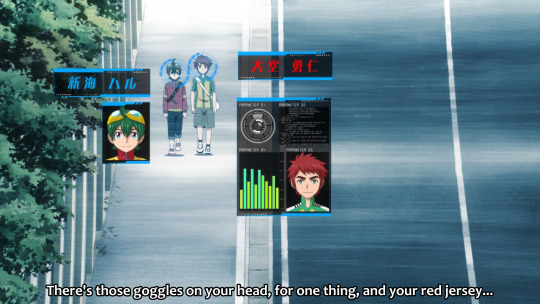
(This meta was requested by @digitalgate02, who also assisted me with a large portion of it. Thank you for your help!)
Takato and Haru often beg a lot of comparisons because of the fact they go so against the usual “brash hero” archetype common to not only Digimon but also shounen franchises in general, being significantly more mild-mannered (on a language level, they’re also the only Digimon protagonists to date who use the more polite boku first-person pronoun instead of the more assertive ore). Haru himself even points out in Appmon’s very first episode that this kind of personality would normally be more suited towards a side character than a protagonist!
Because of that, Haru is often considered to be a spiritual rehashing of Takato, and many have tried to make close parallels between the two, but while the desire to make comparison is naturally understandable, the truth is that beyond surface temperament, the two characters actually have very little in common. In fact, both Tamers and Appmon take rather different approaches to their definitions of a “conventional hero”, and that results in both Takato and Haru having very different roles in the plot.
In many cases, the role of a protagonist in a narrative has a deep relationship with what kind of narrative it is in the first place, and especially what kinds of themes it wants to present. For instance, in the case of 02, you could argue that the story is more “about” Ken than it is about Daisuke, since both major arcs in the story are about his fall and reformation, but when you consider the major themes present in 02′s narrative about purpose in life and pragmatism, Daisuke’s way of life and overall attitude are vital elements in relation to them, and it’s why he ends up being the “protagonist” (or, more accurately, the character at the forefront of the story) despite Ken’s heavier connection to it.
Tamers and Appmon have a number of similarities in storytelling, mainly that they’re both “hard sci-fi” stories in comparison to other entries that have stronger fantasy elements, and do have a certain amount of crossover in terms of dealing with AI-related topics. However, the actual “nature” of each work ultimately turns out to be different, and thus impacts how each of their protagonists is presented.
I heavily dislike calling Tamers a “deconstruction” of the monster collecting genre or of Digimon Adventure, mainly because of how much that term has been exploited to stereotype works in a genre as being things they’re not, or less nuanced than they actually are (as one Twitter user aptly put it: “a deconstruction is when I like something in a genre I disrespect”). I absolutely do not care for the idea of claiming that Adventure or 02 were somehow less nuanced or “deep” than Tamers just because they were more idealistic or more subtle about it, because they sure as hell had a lot of deeper things hidden between the lines if you bother to look out for them, and I also don’t like the implication that Tamers exists to criticize Adventure for supposedly being too naive. It is true, however, that Tamers re-examines a lot of Adventure (and 02)’s concepts in a different context; while Tamers isn’t as strong of a theme narrative, and it’s much more difficult to say there's an overarching message that encompass most or all of the series as much, it does indulge in a lot of thought experiments and smaller subplots that wouldn’t be possible in Adventure, and Takato thus has an important position in facilitating those kinds of thought experiments. The overall franchise metaphors of “growing” (evolving) alongside your Digimon (or, at least, something different from you) and the symbolism associated with it are still more than present, so the Tamers way of showcasing it is in mainly presenting the question of how that kind of goal would even be achievable in the first place when things aren’t as clear-cut.
In particular, Takato serves to address how someone who doesn’t fulfill the typical protagonist mold would cope with situations that somewhat resemble those in Adventure, what would happen when a Digimon partner is fundamentally different from oneself, and how one would still be able to grow alongside such an existence. Thus, his own character arc is more relevant to his own personal growth in accordance with interacting with Guilmon and what he gets out of his journey. This is especially because one thing particularly unique to Tamers is how it portrays Digimon as significantly more feral and different in mentality to humans, which means that he had a much higher personal hurdle to begin with, and thus his personal story and what he gets out of it becomes of significantly more importance.
Appmon, on the other hand, very much is an overarching theme narrative and isn’t exactly subtle about it, with one of its biggest questions being about what’s important in a world that’s getting increasingly controlled and regulated by modern technology that’s getting more and more intelligent. Haru is thus the embodiment of Appmon’s answer to that question: “to choose to be kind” -- and the less-than-subtle invocation of the word “protagonist” ends up having a very different meaning invoked in its final episode.

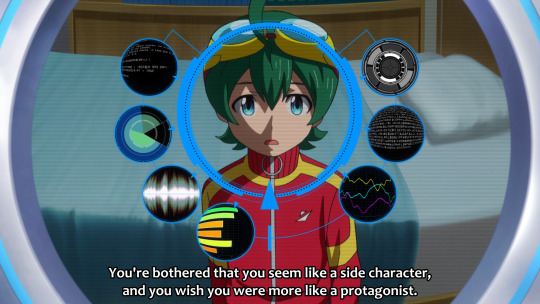
At the very least, on top of both being rather unconventional protagonists, both Tamers and Appmon do start with Takato and Haru both expressing a desire to be more like one who could go on some kind of adventure (Takato’s version isn’t as verbal, but his way of enthusiastically putting on goggles as proof that he’s a Tamer in Tamers episode 2 carries heavy implications of wanting to emulate the heroes he saw on TV).
However, this is where we get our first difference: Takato proudly claims his newfound status as the series protagonist, whereas Haru is unsure and self-conscious about it -- Haru himself is the one who initially considers himself not cut out for the role despite Yuujin personally believing he does and Gatchmon trying to urge him into it. And, in fact, this is actually the difference that kicks off where their paths entirely diverge.
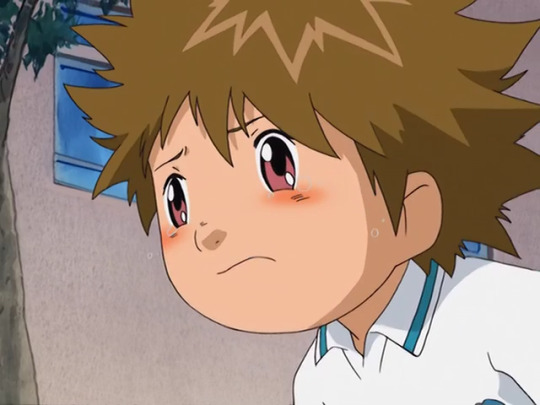
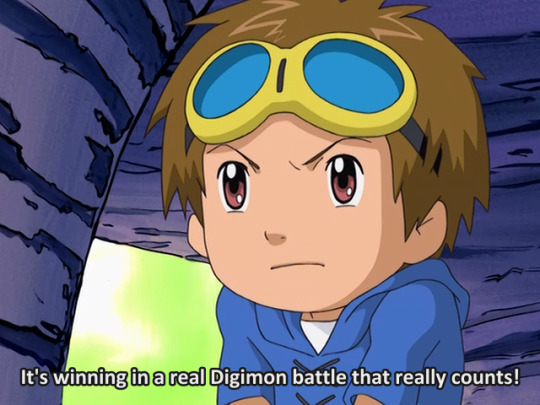
Takato is often said to be unconventional for a protagonist, but when you really think about it, it’s not like Taichi or Daisuke were exactly models of typical protagonist tropes; while you could call them “hot-blooded”, in the end, Taichi’s standout traits have more to do with natural charisma and sometimes even being too chill, and Daisuke, for all he seems assertive, is actually extremely deferential. So why is Takato still such a standout in comparison?
Well, when you look at the detailed profiles of all twelve of the main Adventure and 02 cast, you might notice something: all of them are naturally selfless people who put others before themselves without a second thought. On the other hand, when you look at Takato, you might realize that this is very much not the case, especially during the early parts of the series. As much as Takato is a “soft” person, he’s not necessarily very “kind” or “nice”, especially during the early parts of the series; he can get possessive or clingy, petty, or even a little arrogant (Tamers episode 11 basically has him go on a mini-power trip based on his card combo having worked so well in the prior episode, which ends up becoming part of his isolation from Hirokazu and Kenta in the following one). Moreover, Takato loses his emotional composure and becomes a crying mess as early as Tamers episode 2, and while it’s not like other characters in Adventure and 02 hadn’t been prone to emotional outbursts, combine it with the above facts and you get the take-home that Takato isn’t “soft” out of an active choice to be so as much as he’s just really, really lacking in emotional mettle to begin with.
To be fair to him, Takato has to deal with quite a bit more stress during the early parts of Tamers than Haru has to during the equivalent parts; having to deal with a Digimon partner that’s outright feral at times and doesn’t have a fully intelligent understanding of how to communicate is a pretty rough thing to start off with. That said, Takato is fairly cowardly even in situations that don’t necessarily have to do with this, it’s just that this makes it worse -- but it means a lot that Takato himself is willing to put in that much effort in bonding with Guilmon despite being initially intimidated by what he’d just created, and that perhaps is what’s the beginnings of how he continues to develop that strength of heart for the rest of the series (and also extends to how he’s the one who connects with Grani).
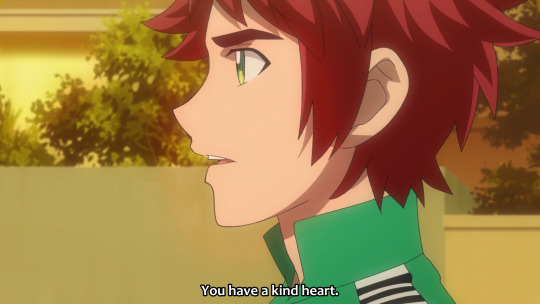
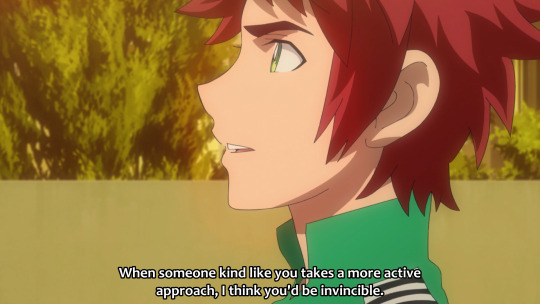
This is in contrast to how Haru is described by Yuujin at the end of Appmon episode 1, in which Yuujin states that Haru is already cut out to be a protagonist because he’s a kind person -- in other words, Takato is someone who is not cut out to be a protagonist of any kind of adventure at the start of Tamers, even though he thinks he now gets the luxury of being one due to the circumstances he’s thrust into, whereas Haru is already someone with the potential to be one even at the start of the series, but initially lacks the self-confidence to consider himself able to be so. Thus, Takato’s character arc involves having to actually grow into someone worthy of the position, whereas Haru’s involves coming to terms with the aspects of himself he already has but doesn’t quite understand yet.
One very important thing to reiterate is that “unconventional” does not necessarily mean “better” by default, and, on the flip side, just because Takato isn’t as virtuous of a person at the beginning doesn’t mean he’s a worse character (after all, these kinds of things are what makes one interesting). Rather, it’s more important to consider why these characters are this way based on the context of the narratives they’re in.
In the case of the Adventure/02 kids, getting twelve naturally kind kids wasn’t exactly accident, nor was Haru and the other Appli Drivers also being that way; said kids have a bit of selection bias in that they were deliberately chosen by various entities (”the one who wishes for stability” and the Agents, the Holy Beasts, or Minerva) knowing that a massive world- or humanity-threatening crisis was on the horizon and quite understandably picking kids who had the greatest potential for the kindness that shouldering the world’s burdens would take (in Adventure and 02 this manifested in having the kids resonate with Crests and Digimentals that represented virtues, and in Appmon this involved Minerva actively testing them). After all, it’s only natural that anyone with the chance to recruit people to help with a monumental task would ideally go out of their way to pick people who seem best suited for the job, whether it’s something as grand as fantasy chosen hero picking or something as simple as job recruitment. But at the beginning of Tamers, none of the involved parties were really aware of any kind of grand, looming threats on the horizon, and whatever the DigiGnomes were thinking (or not thinking) when giving Takato his D-Ark is arcane to us all, and so Takato ended up becoming a Tamer by functional accident, resulting him starting off very poorly equipped for the job and having to learn how to do it on the fly.
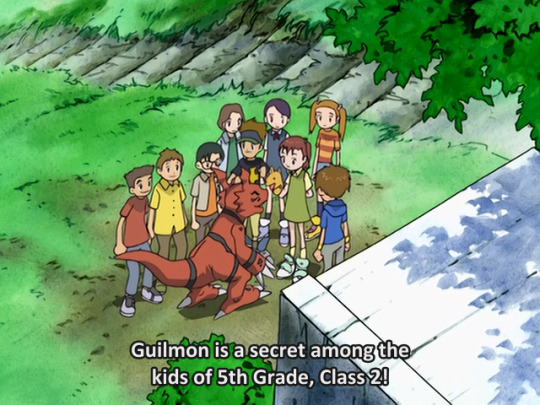

This also means that the “motives” Takato and Haru have for taking action at the beginning of the series are accordingly different. Because any concept of “stakes” was not immediately apparent at the start of Tamers, Takato’s motivations for being a Tamer are more self-centered and selfish than Haru’s are for being an Appli Driver at the start of their respective series.
Takato’s motives at the beginning of Tamers really just revolve around “I want to be able to play with Guilmon more and not lose him,” and there’s no indication at said beginning that he’s really prepared for or even understands the part about having to protect others from harm. That doesn’t mean that Takato’s a selfish person to the extent of not caring about others at all -- in fact, by the time of Tamers episode 15, he demonstrates an understanding that they’re not playing a “game” anymore when things get difficult (and even puts his foot down in front of the other kids for it, a huge improvement from his rather cowardly outlook at the beginning of the series), so the issue largely had to do with the fact that the early parts of Tamers didn’t immediately make such high stakes clear, and Takato himself was thus in a situation of not worrying about others because that necessity wasn’t there yet. But even in the same episode, Takato still has a clear motive of wanting to show off his cool Digimon partner to the others and bask in his “status” as a Tamer, and it’s still a huge contrast to Haru who was initially too humble to accept his role as part of such a larger narrative until his desire to “protect everyone” won out. It’s a big deal that Haru understood the stakes that would be involved in the fight against Leviathan from day one, and actively chose to opt in because of his selflessness.
Another major reason for this difference is that Haru has a certain character trait explicitly ascribed to him that isn’t with Takato: Haru enjoys reading books and is actually rather book-smart and intellectual. On a certain technicality, Takato being characterized as not particularly skilled in that department actually brings him a little closer to the conventional shounen protagonist archetype than it does a “bookish” character like Haru, because such a character is often considered too nerdy for the protagonist position -- but in Haru’s case, the fact he’s actively thoughtful and ruminates on things means that he spends a lot of time thinking about “what’s the right thing to do” in a given situation.
For all it’s worth, I really hope that the above won’t be taken as an implication that Takato is a fundamentally bad person for having more selfish immediate priorities than Haru or the Adventure/02 kids do; having to carry the weight of such a large thing is a huge thing to ask of someone, especially when we’re talking about someone who kind of got thrown into this whole mess and has been spending the entirety of this series trying to figure it all out without a lot of reliable sources of help. On top of that, it should also be noted that Takato is ten; if there’s anything that can be said to be not entirely true-to-life with the Adventure and 02 cast personalities, it’s that a lot of the emotional awareness and levelheadedness they exhibit usually come from people much older than 8-12 (it’s one of the “acceptable breaks from reality” employed in kids’ shows that kid protagonists are often a tad bit more mature than actual kids would be at that age, otherwise a lot of said kids’ show plots wouldn’t function), and real ten-year-olds in Takato’s situation would often have more difficulty knowing what to do with such great burdens at this age. It’s actually fairly significant that Haru is 13 and from a group composed mainly of middle schoolers, in contrast to the older series having elementary school kids (the youngest Appli Driver, Astra, is actually the same age as a classic Digimon series protagonist), and thus it’s probably not surprising that they’re more willing and able to deal with such huge issues much earlier on.
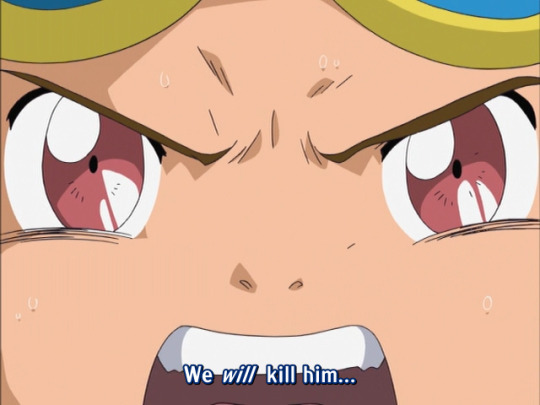
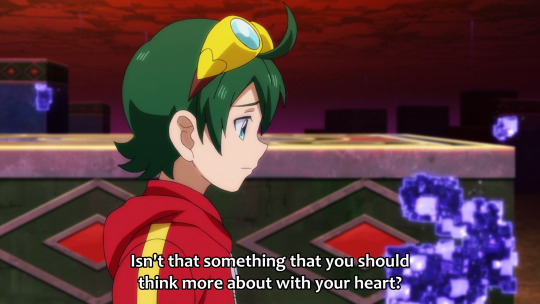
Thus, although Takato’s character arc does involve him slowly growing into the role of becoming less shallow and selfish, and becoming more truly assertive while he’s at it, this fundamental difference in their natures ends up continuing to have a major influence by the time of the later parts of the series. The difference can be most starkly illustrated in Tamers episode 35 versus Appmon episode 41 -- in which Takato, upon seeing Beelzebumon kill Leomon, is utterly consumed by his emotions and decides that the best course of action to take would be killing Beelzebumon in revenge, even though this won’t bring Leomon back or accomplish anything productive (and, indeed, it does make things worse in the form of driving his own partner over the edge and traumatizing Juri further). (Adventure had already warned that prioritizing “revenge” over “protecting others” is foolhardy and tends to cause a lot of really nasty problems.)
In contrast, one thing you might notice about Haru is that he never “denies anyone’s feelings”, even when confronting someone like Knight. You could argue that Haru wasn’t necessarily dealing with direct trauma in front of him, but recall that Knight had caused tons of grief and misery for many (something Haru takes serious offense at) and had, along with Charismon, gotten very close to permakilling all of the Buddy Appmon at one point back in Appmon episode 37 -- so it’s not like Haru doesn’t have reason to have grudge against Knight, even if the severity isn’t as immediate. Note that Haru doesn’t “both-sides” this issue; he still insists on making his own case, it’s just that he still doesn’t have it in him to not acknowledge that Knight has a good reason for making the case he does given his background, consider his words to an extent, and fight against the idea of having Knight be killed for no good reason. Haru has a very strong belief in “thinking with one’s heart” and “respecting feelings” that he'd exhibited through the entire series (for example, very prominently in Appmon episode 12 with Rei), and because of that he has a ton of emotional control over himself even taking some very harsh things. It’s clear that Haru does have very deep understanding of what he’s dealing with -- and chooses to be idealistic and kind anyway.
(In addition, because Haru is so naturally inclined to be selfless, the one time he really does hit an emotional low in Appmon episode 49, it’s not anger or lashing out at anyone, but rather sadness and despair. Haru just really does not have the fundamental capacity to be aggressive.)

As said before, Takato’s character arc is very much a personal story of how he grew into the role of a Tamer, via learning to fight for what’s important and have a strong heart for it. As a result, his motives for fighting end up still having a much more personal streak to it than anything -- at the time of Tamers episode 49, technically speaking, the Wild Bunch was still being counted on to work on the D-Reaper problem, and his own family was urging him to stay home for now, but what tipped him over the edge was not some desire to protect people as a whole but rather the fact that Juri was calling for him. It’s not to say that such a thing is selfish -- he’s clearly doing it for her sake, not anything to do with his own -- but nevertheless his involvement was directly related to something that hit a little more personally moreso than it was for the sake of the wider picture.
As said before, this is fitting for someone whose story is really more of a personal character arc before anything else; the significance is more in line with the sheer amount of emotional growth Takato had to go through in order to get to this point at all, and how someone normally so divorced from the concept of heroism could come to do something so meaningful, especially thanks to his interactions with Guilmon and growing alongside him. There’s absolutely no doubt that Takato wouldn’t have been able to do this kind of thing at the beginning of the series, so it’s a huge accomplishment that shouldn’t be watered down. It also makes him a very good foil to the D-Reaper, an emotionless program that’s still fixated on rehashing the same destructive purpose it was originally created for years ago and has long lost its purpose, and while Takato isn’t technically the sole factor in putting it to rest (at most, the most valuable asset as part of the Wild Bunch’s plan), the contrast is quite apparent.
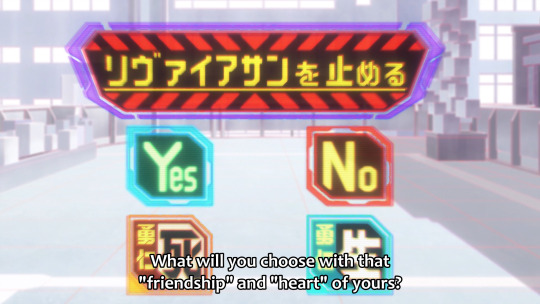
On the flip side, Appmon episode 54 not only involves the exact opposite -- in which Haru sacrifices something closely personal to him for the sake of everything else -- but also ties it very closely to its own series themes, which are assertively laid down in all of their glory during this finale. The reason Haru had been “chosen” by Minerva to begin with, and the reason he himself had been given an opt-in “choice” at the beginning of the series and again in Appmon episode 38, and so many other characters had been given “choices”, is that this story is about choices -- because Leviathan (and Knight, and any kind of “AI should manage everything” argument that this series fights hard against) believes that humans shouldn’t be allowed them, and that everything ought to fall in accordance with a “rational” system. Haru, on the other hand, believes in the human heart that can do unexpected things, and his constant choices to do things out of kindness despite understanding what they entail.
Over the course of the series, Haru hadn’t always been putting himself in a spotlight situation -- in fact, many episodes had involved him saying “we’ll support you!” and generally uplifting others before he’d ever tried to take charge. But in the end, the reason he ends up as the “protagonist” who makes the final choice for everyone’s sake is because he’s the one who understands that gravity of “making a choice with one’s feelings” that’s so vital to changing Leviathan’s mind -- plus, the fact he’d been so supportive and kind to everyone means that everyone else shows up for him when he needs it most. Note that when Astra and Eri are upset at Yuujin in Appmon episodes 48 and 51, it’s not so much out of the overall betrayal as much as the fact he specifically betrayed and hurt Haru, because that’s how much they’ve come to care for him in return.
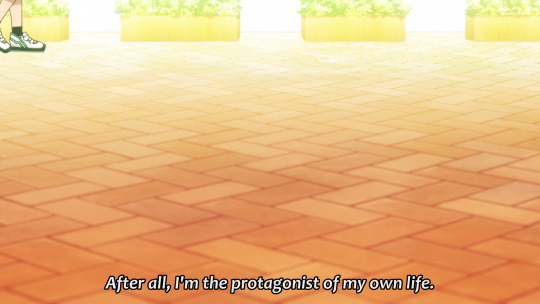
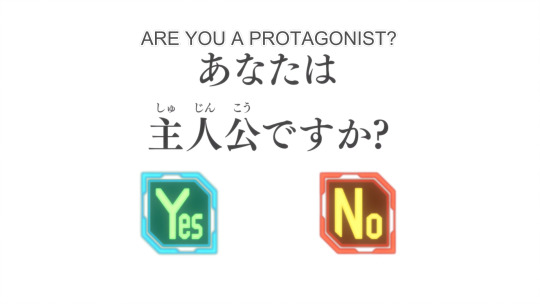
Hence, why Appmon latently ends on a frame of redefining the concept of “protagonist” -- certainly, on a meta level, Haru became the “protagonist” of the narrative that is Appmon, but what it actually means in terms of what Haru became is that everyone, including the members of the audience watching this series, is “the protagonist of their own life”, meaning that being a “protagonist” is defined merely by said act of “making choices” and defining what your own path will be. And especially in a world where singularity is going to become more and more of a real possibility -- as the show indirectly reminds us, AI surpassing human intellect is something that’s been predicted and warned about in this very world we, the viewers, live in -- understanding this is going to become even more important.

Incidentally, in the end, as much as it might be tempting to try and draw parallels with Takato because both of them are in the franchise-mandated position of “protagonist”, removing that requirement actually brings up a character that might make a much closer parallel -- “making choices that are out of kindness” easily directly invokes a certain other character from 02 who had “kindness” as a huge part of his character arc, doesn’t it...?
Really, if you think about it, Haru has a lot in common with Ken, who’s also thoughtful, intellectual, very in touch with his own feelings, assertive, resilient, strong in heart, and kind out of choice even when he doesn’t have to be -- you could basically say Haru is what Ken would be like if he hadn’t gone through such a massive formative event of trauma early in his life, or, alternatively, Ken if he had a bit more of Daisuke’s more outwardly bright, friendly, and supportive traits. It may not be a comparison you’d be easily tempted to make because, as stated above, as much as Ken had a deep connection with 02′s plot, he’s not portrayed as the protagonist of his own narrative...and, hence, Haru is unusual in that the exact archetype that was formerly placed in the role of the series deuteragonist has now been recast in the role of the protagonist itself. But then again, from Haru’s perspective, it’s not like Ken wasn’t technically the driving force of his own story, right?
(I’m not just drawing this comparison because I usually blog for 02. I promise.)
116 notes
·
View notes